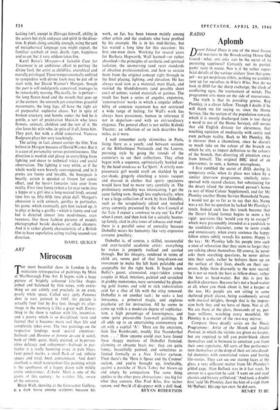RADIO
Aplomb
Desert Island Discs is one of the most lissom ,old warriors in the Broadcasting House Old Guard—what. one asks can be the secret of its persisting sappiness? Certainly not its partici- pants' taste in music. Nor is it the rather super- ficial details of the various visitors' lives that com- pel—we get no private titbits, nothing we couldn't turn up for ourselves in Who's Who. Nor do we look in DID for the sharp exchange, the clash of conflicting egos, the tournament of minds. The programme errs more on the side of reassurance.
The truth is that its presiding genius, Roy Plomley, is a clever fellow. Though I doubt if he will thank me for saying so, since the Home Service, like the section of the population towards which it is mostly discharged (aim is too sharp a word to use of the Home Service), still nurses that old English distaste for cleverness, that touching equation of mediocrity with sanity and even perhaps reality. Back to Mr Plomley. He is cleverer than a chameleon, since he doesn't so much take on the colour of the branch on which he sits, as impart definition to the colours of the branch, thus diverting all attention away from himself. The original BBC ideal of an interviewer, in sum, a human microphone.
I first rumbled the secret of DID, during its temporary exile, when its place was taken by a similar interview programme, similarly inter- spersed with record choices, but substituting for the desert island the interviewed person's home (a sort of blind Colour Supplement), and for Mr Plomley another Home Service Household Name. I would not go so far as to say that this Name was a nit, but no question he lacked Mr Plomley's touch. Indeed such has this touch become that the Desert Island format begins to seem a bit rigid : questions like 'would you try to escape?' which were presumably intended as a yardstick to the candidate's character, come to seem crude and unnecessary, when every sentence the happy fellow utters subtly reveals his nature. Happy is the key: Mr Plomley lulls his people into such a state of relaxation that they seem to forget they are talking about themselves. Of course, he never asks them searching questions, he never delves into their souls, rather he bolsters them up on the surface of their lives, dwells on their suc- cesses, helps them discreetly to the next record; he is not so much the host as fellow-diner, rather the host as head-waiter. But this is just his devilish cleverness. Because he's not a head-waiter at all, when you think about it, but a keeper at the zoo. His people are not sitting in some sheltered plush alcove, being assiduously served with musical delights, though that is the impres- sion both they and we have of them. Not at all. We are there at the glass, thousands of us, per- haps millions, watching every mouthful. Mr Plomley is a master of the two-way mirror.
Compare those deadly series on the Music Programme : Artist of the Month and Studio Portrait, in which the victims are given no keeper, but are required to tell you point-blank about themselves and in between to entertain you from their own repertoire. All sorts of fine performers turn themselves at the drop of their art into dread- ful dummies with constricted voices and boring life-stories. They can see our staring faces at the glass, a very different matter from Mr Plomley's gilded cage. Alan Bullock was in it last week. In answer to a question he said: 'I went on and read classics and history at Oxford."And took a double first,' said Mr Plomley. Just the hint of a sigh from Mt...Bullock. His cup ran over. So did ours.
HENRY TUBE










































 Previous page
Previous page